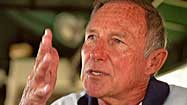Former Los Angeles Police Chief Daryl F. Gates, who led the department for more than a decade, has been hospitalized with bladder cancer, sources said Tuesday.

Chief Charlie Beck informed the police commission during its Tuesday meeting that he had visited the former LAPD chief in the hospital over the weekend. Beck said Gates, 83, had a "very serious malady." He did not describe the nature of Gates' illness.
"I ask everyone to keep him in their prayers," Beck said.
According to sources familiar with Gates' medical condition, however, he has been hospitalized for several weeks with bladder cancer that has spread to his bone structure near his hip. Gates has been receiving radiation treatments to eradicate the cancer and his doctors want to then start chemotherapy for the tumor in the bladder.
"Los Angeles police officers are praying that Chief Gates will have a quick recovery and be able to get back to making frequent appearances to honor officers for their service -- from retirements and funerals to ceremonies and charity events -- as soon as possible," said Paul M. Weber, president of the Los Angeles Police Protective League, the police union.
Gates, once a driver for former Chief William H. Parker, rose through the ranks to serve as department chief from 1978 to 1992. Throughout his career he made headlines, often verbally sparring with Mayor Tom Bradley and council members. Known as the father of the modern SWAT team, he retired in 1992.
His retirement occurred after the riots following the Rodney G. King beating trial. But the pressure for Gates to retire came before the riots when the Christopher Commission issued a scathing report on the department under Gates. The commission findings signaled a new era of LAPD management.
Many police experts say Gates help developed many of the tactical responses used in modern policing. Gates, who attended Beck's recent swearing-in as chief, remained a popular figure with rank-and-file officers in retirement. While in office, however, his relationship with the Los Angeles Police Protective League was often combative.











